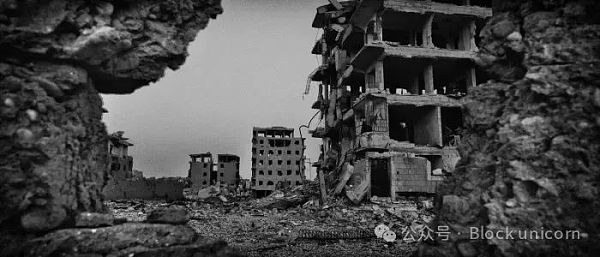Article author: LEON WANKUM Article compilation: Block unicorn
Introduction
We live in a highly digital world, but most people still use physical goods to store value. The most commonly used store of value in the world is real estate. According to statistics, approximately 67% of global wealth is held in real estate. However, recent macroeconomic and geopolitical headwinds have highlighted the vulnerability of real estate as a physical store of value. What if a war breaks out? What happens if the home used as a store of value is destroyed?
In German, real estate is translated as "Immobilie", which literally means "immobility". Owning real estate creates local dependencies, which can cause problems in a world of increasing conflict and radicalization. If a war breaks out, you can't take real estate with you and it can be easily destroyed.
This may sound like a dystopia, but I believe that if you are serious about long-term wealth management, you should consider worst-case scenarios and possibilities global impact.
War and the destruction of wealth
Since the beginning of the 21st century, the losses caused by war to mankind have never been so great. Last year, more than 238,000 people were killed in the conflict. Syria, Sudan, Ukraine, Palestine, Israel, Lebanon – the sources of conflict are increasing around the world. Some of these areas have already suffered massive damage. There are no more properties out there and the value stored in them has effectively evaporated. In addition to the pain and sorrow caused by war, it is difficult to imagine how much economic setback people endured.

Real estate is used as a store of value all over the world, although there are some exceptions, such as Japan. As the threat of disruption intensifies, the fruits of the labor of millions, if not billions, of people are at stake. Alongside inflation and taxes, the destruction of material wealth has historically been one of the greatest threats to overall prosperity. Already in ancient times, armies ruthlessly pillaged cities and destroyed their residents' belongings.
Physical and digital value storage
Lucky The thing is, with Bitcoin, the threat of destruction of wealth stored in physical assets is solved. As a digital, near-perfect mobile store of value, it is difficult to destroy and easy to move.
The launch of Bitcoin in 2009 challenged real estate’s role as humanity’s preferred store of value because it represented a better alternative, It allows people around the world to protect their wealth with relative ease.
You can buy Bitcoin in very small denominations, as small as 1 Satoshi (1/100,000,000 of Bitcoin), for as low as ≈ $0.0002616 USD (2024 February 12). All you need to store it securely is a computer without internet access and a BIP39 key generator, or just spend $50 to buy a hardware wallet. If you ever need to relocate, you can remember 12 words, a backup (mnemonic phrase) for your wallet, and "take" your Bitcoins with you.
Digitalization
Digitalization optimizes almost all value preservation functions . Bitcoin It is rarer, easier to obtain, cheaper to maintain, more liquid, and most importantly, it allows you to transfer your wealth in times of crisis.
Bitcoin is wealth that truly belongs to you. With the threat of war looming around the world, I believe it is better to hold wealth in digital assets like Bitcoin than to hold physical assets like real estate, gold, or art, which can easily be taxed, destroyed, or confiscated.
Property Forfeiture
If we look back at history, it is clear , physical stores of value make people vulnerable to excessive government intervention. One historical example is the expropriation of the Jews by Nazi Germany. Unfortunately, these repressions are not unique in history. This happens all the time. As Michael Thaler likes to point out, many people lost their property in Cuba when Fidel Castro came to power.
These painful historical lessons underscore the importance of protecting wealth in digital assets such as Bitcoin, which has proven challenging to confiscate, tax or destroy. , and it’s easy to transfer.

Macroeconomic changes
In addition, changes in the macroeconomic landscape may cause real estate to depreciate rapidly. Typically, real estate is purchased with a loan. Therefore, rising interest rates lead to lower financing affordability, resulting in lower demand and thus lower real estate prices. We can see this playing out now across the globe, with the combination of rising interest rates and reduced demand leading to a decline in property values across the globe.
Bitcoin VS Real Estate
Compared to Real Estate , Bitcoin is less affected by the problems of the traditional fiat currency financial system because it operates independently of the system. Variables such as interest rates, central bank decisions, and arbitrary government actions have a limited impact on Bitcoin, with price primarily determined by its supply, issuance schedule, and adoption rate.
Bitcoin follows a deflationary model, meaning that its supply gradually decreases over time until it reaches a hard limit in 2140. Every four years, the Bitcoin block reward is halved (Block unicorn note: For example, the miner’s reward for packaging a block is 10 yuan now. Since the Bitcoin reward will be halved four years later, the reward for the miner will only be 5 yuan. ).
The upcoming halving on Friday, April 19, 2024 is expected to halve the block reward from 6.25 Bitcoins to 3.125 Bitcoins. That means 450 Bitcoins are issued every day, not 900.
Currently, Bitcoin’s annual inflation rate is about 1.8%, which is expected to drop to 0.9% after the upcoming halving. Since then, inflation has become almost negligible. In addition, a large number of Bitcoins have been lost, and we can foresee that many more Bitcoins will be lost in the future. The continued decline in limited supply increases deflationary pressure on the Bitcoin network. As more people (and machines) use Bitcoin, the increase in demand is offset by the decrease in supply.
This extremely strong deflationary movement cannot be observed in the real estate field. Although real estate is scarce due to limited supply of building land, there is no hard cap. For example, new building sites could be developed and zoning laws could allow for taller floors.
Absolute scarcity
For most people, It is difficult to imagine the impact of fixed supply on asset prices. Before Bitcoin, the concept of inherently scarce goods did not exist. Even gold has an elastic supply. Increased demand drives mining to become more intensive, and this flexibility does not apply to Bitcoin.
Therefore, every halving event means that the supply is reduced, and the price of Bitcoin will increase and continue. This permanent growth will continue as long as there is corresponding demand, which may be attributed to Bitcoin’s special monetary properties.
This dynamic is expected to continue even during the global economic crisis. The supply of Bitcoin will continue to decrease and the price will likely continue to rise. As explained, due to the continued demand expected in times of crisis. Even inflation can have a positive impact on the price of Bitcoin as it leads to an increase in the supply of fiat currencies that can be invested in Bitcoin.
End
In an increasingly radical In a world where the financial system is being transformed and is going through a profound crisis, Bitcoin becomes the best choice to store value, especially in times of macroeconomic fluctuations. During this tumultuous time, Bitcoin’s importance is expected to rise, potentially replacing real estate as humanity’s preferred store of value in the distant future.
We hope that more and more people will realize the advantages of Bitcoin, which can not only preserve wealth, but also protect livelihoods in extreme circumstances.
 Anais
Anais









